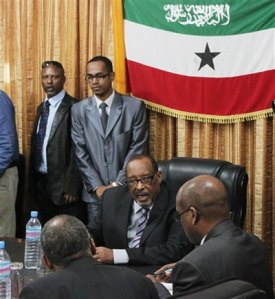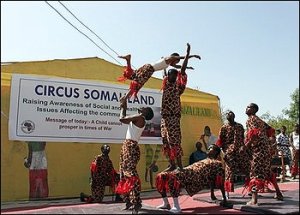














US eyes Somaliland as answer to Mogadishu’s woes

In this photo taken Wednesday Oct. 13. 2010 Somaliland President Ahmed Mohamud Silanyo, seated, meets with officials from the U.N., European Union and the World Bank in Hargeisa, Somaliland. Somaliland officials say the U.S. and the the international community have wasted too much time and money on Mogadishu instead of supporting a struggling but democratically elected government in Somaliland.(AP Photo/Jason Straziuso)
By JASON STRAZIUSO, Associated Press Writer,
Friday, October 15, 2010
HARGEISA, Somalia — A new six-story office building will soon house a $1 billion-a-year business. The recently elected president has appointed smart people and won the admiration of the international community. Gunfire is nowhere to be heard.All this seems too good to be true for the war-ravaged nation of Somalia. Yet Somalia this is, or more precisely Somaliland, a slice of the northern part of the country.This former British colony joined Somalia a half-century ago but changed its mind in 1991 when the central government in Mogadishu collapsed and most of the rest of the country became mired in war. The United States, the United Nations and other international players don’t recognize Somaliland as a separate country, but they are now lavishing new money and attention on the region.Somaliland officials say the international community has wasted too much time and money on Mogadishu and its string of failed governments. They say the struggling but democratically elected government in the north deserves support and can serve as a bulwark against spreading terrorism.
In bullet-riddled Mogadishu and in much of the rest of Somalia to the south, a hardline Islamist insurgency is in control and is threatening the central government’s tiny hold on the country. To the north, across the narrow Gulf of Aden, lies Yemen, a hotspot for Islamist militancy.
“This is a country called Somaliland that is peaceful and democratic … where the streets are full of uniformed children with book in hand going to school, not hooded, with guns, going to war,” President Ahmed Mohamud Silanyo told a visiting delegation from the U.N., EU, World Bank and African Development Bank earlier this week.
A six-story cement building dominates this city’s skyline. Once completed, it will house the headquarters of a money transfer company that operates in 144 countries.
Yet Somaliland is bathed in poverty. Huts fashioned from scrap metal and wrapped in plastic sheeting dot the capital, crammed full of the internally displaced. Rusted cars are heaped in a jumble. Discarded plastic bags snag on cacti growing in the sandy ground. Goats and sheep wander the streets, seeking shade from the afternoon sun.
Since his June election, Silanyo has tapped Somaliland’s diaspora to recruit U.S.- and British-educated technocrats to run the country. He slashed the size of his Cabinet, instilling confidence in the international community about the way he will run Somaliland, an area the size of North Carolina with 3.5 million people.The successful election and the new government’s serious approach merit increased attention, said Mark Bowden, the top U.N. humanitarian representative for Somalia.Somaliland became independent in 1960 before joining Somalia only days later. Because no country has yet recognized its 1991 declaration of re-independence, the world community sees it as part of Somalia. Business leaders at a trade fair in Hargeisa this week said the lack of recognition creates impediments to economic growth: No access to credit, high insurance rates on imported shipping, severely restricted ability to travel.
Despite the poverty and restrictions, the government has capable, educated leaders who are infusing the town with a can-do spirit. Dahabshiil, the money transfer company building the six-story headquarters, facilitates the transfer of $1 billion from Somaliland’s overseas diaspora. And many of those diaspora’s leaders are returning here.
Hussein Bulhan, a Harvard-educated former professor at Boston University, is the president of Hargeisa University. He believes the U.S. should take notice and invest more.
“Following Sept. 11, the focus has become fighting terrorism,” said Bulhan. “Too much focus has been put into putting out fires instead of building the peace.”
Johnnie Carson, the top U.S. diplomat for Africa, announced last month that the U.S. is trying a new, two-track approach to Somalia that will see continued support of the Mogadishu government but also direct engagement with Somaliland and neighboring Puntland, another autonomous region.
More American diplomats and aid workers will travel to Somaliland, Carson said. USAID, the U.S. government aid arm, dedicated $7 million to Somaliland in fiscal year 2009. In 2010 that number is rising to $26 million.
“Where you have pockets of stability and pockets of people willing to actively contribute to develop the country as a whole, it just makes sense to develop their capacity,” said a U.S. Embassy spokesman in Kenya who was not allowed to be identified because of State Department rules.Bowden, the U.N. official, said Somaliland gets about $80 million to $100 million a year in aid money, but that the number could double.Somaliland’s trade fair highlighted the region’s soap makers, tile makers and university offerings. Saeed Odugheal, 40, grew up in Britain but now owns a water bottling company here.
“Somaliland is Africa’s best kept secret,” he said. “What I want to see is a hell of a lot more development money. People talk about creating a democracy. This is a democracy. It’s only right to support a country like that.”
Carson said the U.S. will not recognize Somaliland as independent because the African Union will not do so. Somaliland Foreign Minister Mohamed A. Omar acknowledged that the AU is afraid that if Somaliland is recognized, other regions might clamor for the same. But he said Somaliland’s situation is unique.
“We are not starting a new nation. We have been a nation before,” said Omar, who holds a doctorate in political science from Britain’s University of Birmingham. “We voluntarily joined with Somalia in 1960. We are withdrawing from that union.”
Omar said the region would like to share intelligence with the West and receive more direct security aid, adding that the region has a strong record of fighting piracy and terrorism. Hargeisa was hit by a suicide bomb attack in 2008.
“Somaliland has been attacked by terrorists not only because they hate us, what I think what they are attacking is the principles and values we stand for, which is democracy,” Omar said. “These are universal values that have been attacked. We need universal support and universal defense in order to defend those values.”Somaliland’s minister of mining, energy and water resources traded a six-figure job in Los Angeles for his new role. He said without $40 million in repairs, Hergeisa’s water system could collapse. The minister, Hussein Abdi Dualeh, urged the international community to switch its focus from Mogadishu to Somaliland.
“The aid we get here won’t be torn up by shrapnel,” he said.
Source: AP

In this photo taken Wednesday, Oct ,13. 2010, gymnasts perform at a trade fair in Hargeisa, Somaliland. Somaliland officials say the U.S. and the international community have wasted too much time and money on Mogadishu instead of supporting a struggling but democratically elected government in Somaliland in northern Somalia.(AP Photo/Jason Straziuso) (Jason Straziuso - AP)

In this photo taken Tuesday Oct, 12 2010 a vendor at a trade fair in Hargeisa, Somaliland shows off video conferencing technology. Somaliland officials say the U.S. and the rest of the international community have wasted too much time and money on Mogadishu instead of supporting a struggling but democratically elected government in Somaliland.(AP Photo/Jason Straziuso)

In this photo taken Tuesday, Oct. 12, 2010 Somaliland's Speaker of Parliament Abdirahman M. Abdillahi shows off a new parliament building under construction in Hargeisa, Somaliland. Somaliland officials say the U.S. and the rest of the international community have wasted too much time and money on Mogadishu instead of supporting a struggling but democratically elected government in Somaliland. (AP Photo/Jason Straziuso)













 Madaxweynaha JSL Mudane: AXMED MAXAMED MAXAMUUD (SIILAANYO) ayaa Maanta Guddi heer qaran ah u magacaabay Tayeynta Billicda Caasimada Dalka ee Hargeisa oo ah Muraayadi Dalka.
Madaxweynaha JSL Mudane: AXMED MAXAMED MAXAMUUD (SIILAANYO) ayaa Maanta Guddi heer qaran ah u magacaabay Tayeynta Billicda Caasimada Dalka ee Hargeisa oo ah Muraayadi Dalka.














 HARGEISA, — Mr. Soren Pind, Minister for Development Cooperation of Denmark today arrived the capital of Somaliland, Hargeisa. Minister Pind who was leading a Danish delegate met with Somaliland President Ahmed Mohamed Mohamud at Mansoor hotel where they had a closed door meeting. This was the first time that Somaliland and the government of Denmark has had a such a high level direct talk and this is seen as a positive step in Somaliland.
HARGEISA, — Mr. Soren Pind, Minister for Development Cooperation of Denmark today arrived the capital of Somaliland, Hargeisa. Minister Pind who was leading a Danish delegate met with Somaliland President Ahmed Mohamed Mohamud at Mansoor hotel where they had a closed door meeting. This was the first time that Somaliland and the government of Denmark has had a such a high level direct talk and this is seen as a positive step in Somaliland.























































